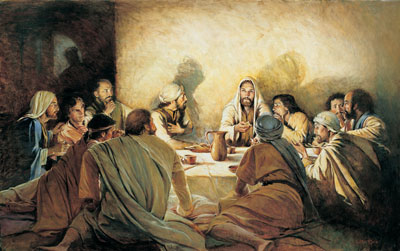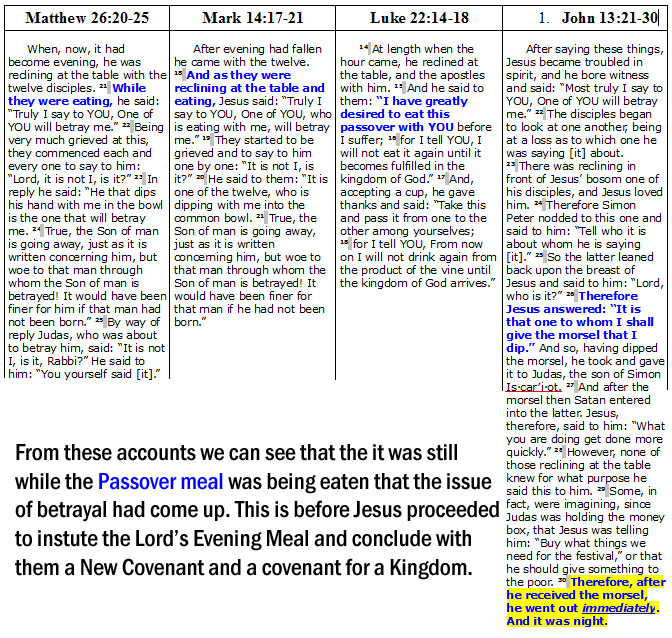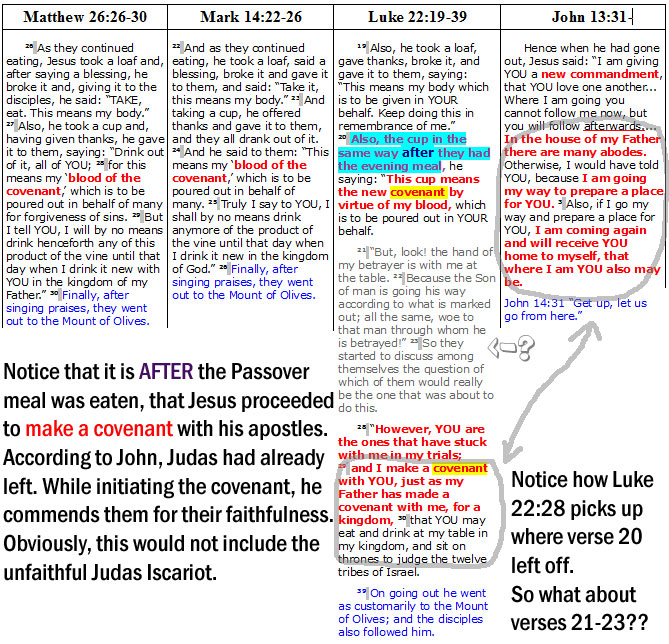Someone asked the following question: Why do Jehovah’s Witnesses say that Judas was not present on the night that Jesus presented the New Covenant, instituted the Lord’s Evening Meal, and made the Kingdom Covenant with his apostles? The simple answer is that this is just what the Bible says. When they gathered for the Passover meal, all 12 were present. But during the meal Judas was dismissed, prior to the institution of what became known as the Lord’s Evening Meal.
However, there is one particular Gospel that causes some confusion. A forward reading of the Gospel of Luke would seem to indicate that Judas was still present when these three things transpired, particularly of eating the bread and drinking the wine that were presented as part of these covenant arrangements. But let us take a close look at the four Gospel accounts, and actually pause to give this some honest hearted, open minded thought.
Now the Passover was a special observance for the Jews under the Law of Moses, to remember when they were delivered from bondage to the Egyptians. The Passover was an annual event, celebrated on Nisan 14th. This is precisely what Jesus and his apostles gather together to do. On the biblical Jewish calendar, each day started at sunset, and so now that it was evening and the sun had gone down, Nisan 14th had started, and it was time to eat the Passover meal, as the sons of Israel had been doing each year for 1500+ years.
From the accounts of Matthew, Mark, and John, it can clearly be seen that the issue of betrayal had come up while the Passover meal was being eaten, before Jesus instituted the Lord’s Evening Meal and the New Covenant and Kingdom Covenant. According to Matthew, Jesus directly tells Judas that it is him. John’s account alludes to the same thing but also add that Jesus told John privately that the betrayer was the one whom he would dip a morsel and hand it to. This morsel, and the gravy or sauce that it was dipped in, were part of the Passover meal, and not part of the Lord’s Evening Meal that would come later and consist only of wine and dry unleavened bread. According to John, Judas leaves immediately, perhaps even taking the morsel with him.
Now with the unfaithful traitor gone, Jesus can get on with some serious business…
So we just learned that Judas left during the Passover meal. Now, after the Passover meal, Jesus institutes what comes to be called the Lord’s Evening Meal or Memorial, and also the New Covenant (Jeremiah 31:31-32), and a covenant for a Kingdom. It is Luke’s account that causes some confusion, as the placement of verses 21-23 of his account makes it sound like Judas was present. However, let’s give this some thought.
Would Jesus say he was making a covenant with them because they were “the ones who stuck with me during my trials”, yes, faithful to Jesus the whole time, knowing full well an unfaithful traitor was in among them? Would he allow to be part of the kingdom the very one who betrayed the King and expedited his death? Would you willingly enter into a binding contract with such a man?
John says quite clearly that Judas had left before all this. Remember that John was an eyewitness to these events, whereas Luke was not. It seems that Luke made an effort to record the events that happened that night, but did not necessarily concern himself with the strict chronological order of how things proceeded that evening. John, having written his gospel much later, may even have made specific mention of the moment Judas left in order to clear up any misconceptions that Judas might have been present for the Lord’s Evening Meal.
In considering all four gospel accounts, particularly that of John who was present himself in the room on the night when Jesus instituted the Lord’s Evening Meal, it becomes clear that Judas was not present at that point in the evening. I circled passages from Luke and John above that are separate accounts of the same thing, a thing which Judas was not present for. The verses at Luke 22:21-23 probably should have been placed after verse 18 for a clearer reading.
2 Timothy 3:16 says “All Scripture is inspired of God and beneficial for teaching… [and] for setting things straight.” By utilizing all the scriptures pertaining to this event, we have been able to see things clearly in the manner in which they took place, and eliminate what appears to be a contradiction at first glance.
To sum it all up in a brief few sentences…
Only one gospel account mentions him leaving – John. John says it happened immediately after the discussion of who would betray Jesus. Both Matthew and Mark states this discussion happened before Jesus instituted the Lord’s Evening Meal. John himself doesn’t mention the instituting of the Lord’s Evening Meal specifically, but we know that he did – after the Passover. That makes 3 accounts for Judas having left before the Lord’s Evening Meal was instituted.




